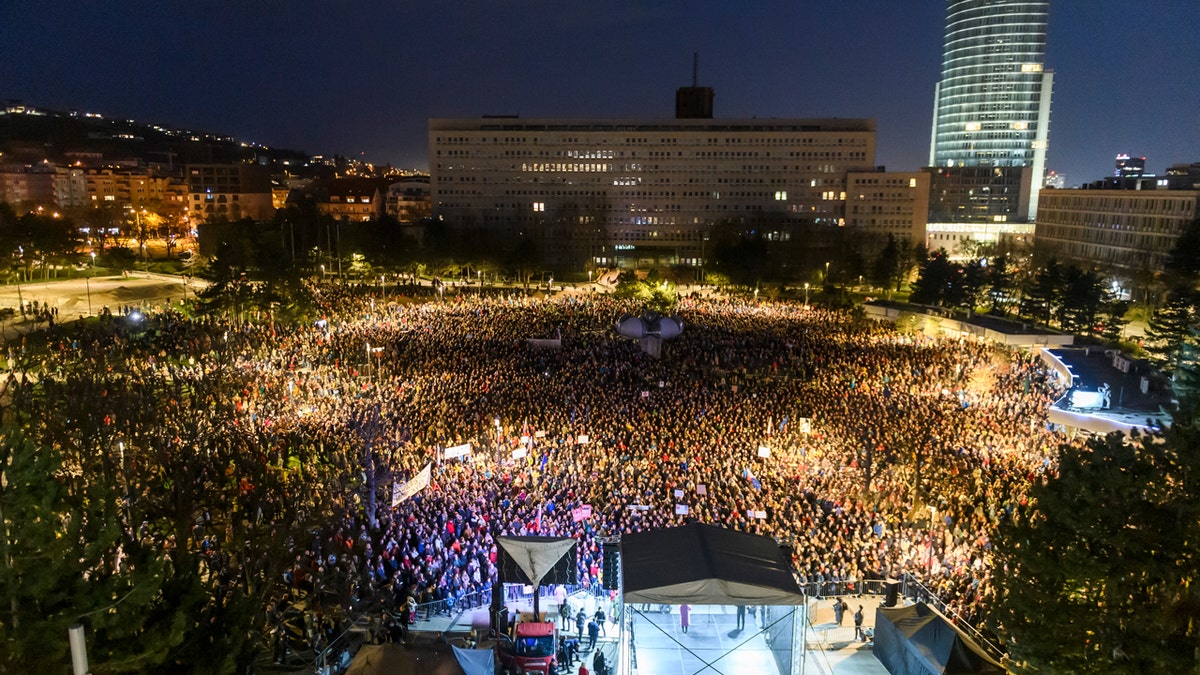Fox News Flash top headlines for March 15
Fox News Flash top headlines are here. Check out what's clicking on Foxnews.com.
- Slovaks turned out in droves Friday to protest the government's planned overhaul of its public broadcasting service.
- The planned change comes amid a wave of similar protests against the populist, Russia-friendly government of Prime Minister Robert Fico.
- Opposition lawmaker Zora Jaurova slammed the proposal as one that would transform Slovakia's public media into "a trumpet for government propaganda."
Thousands of Slovaks rallied in the capital on Friday to condemn a plan by the new government of populist Prime Minister Robert Fico to overhaul the country’s public broadcasting during a wave of anti-government protests.
The protesters in Freedom Square at downtown Bratislava joined President Zuzana Čaputová, local journalists, the opposition, international media organizations, the European Commission and others who warned that the changes would result in the government’s full control of the Slovak public television and radio.
Zora Jaurova, a lawmaker for the major opposition Progressive Slovakia party that co-organized the protest said the changes would turn the broadcaster into "a trumpet for government propaganda."
SLOVAKS TURN OUT IN DROVES TO PROTEST FICO GOVERNMENT'S PENAL CODE OVERHAUL
"We must not allow that to happen," she told the crowd.
According to the plan drafted by Culture Minister Martina Simkovicova, the current public radio and television known as RTVS would be replaced by a new organization. A new seven-member council with members nominated by the government and parliament would select its director, although the current one has a parliamentary mandate until 2027. The council would have a right to dismiss the director without giving any reason.

People gather to take part in a protest against the government, in Bratislava, Friday, March 15, 2024. Thousands of Slovaks have rallied in the capital to condemn a plan by the new government of populist Prime Minister Robert Fico to overhaul the country’s public broadcasting amid a wave of anti-government protests. (Jaroslav Novak/TASR via AP)
"This appears to be a thinly veiled attempt to turn the Slovak public service broadcaster into state-controlled media," Noel Curran, European Broadcasting Union (EBU) director general said in a statement. "That would be a dangerous step backwards for democracy and for freedom of expression."
RTVS is a member of EBU, which is an alliance of public broadcasters.
The attack on RTVS is part of Fico’s major attack on all free media, a statement signed by hundreds of Slovak journalists said.
Šimkovičová said the changes are needed because the current broadcaster is biased and gives space only to mainstream views and censor the others.
About a thousand journalists and others working for the broadcaster denied that was true.
Simkovicova represents the ultra-nationalist Slovak National Party, a member of the coalition government that is a major pro-Russian force in Slovakia. She has worked for an internet television known for spreading disinformation.
Thousands of people have repeatedly taken to the streets across Slovakia recently to rally against Fico’s pro-Russian and other policies, including a plan to amend the penal code that would reduce punishment for corruption and some other crimes and a significant shorten the statute of limitations.
A number of people linked to the prime minister’s party, including lawmakers, face prosecution in corruption cases.
Fico returned to power for the fourth time last year after his leftist party Smer (Direction) won Sept. 30 parliamentary elections on a pro-Russia and anti-American platform.
Known for his tirades against journalists, Fico recently labeled a major television network, two nationwide newspapers and an online news website his enemies and doesn’t communicate with them.
CLICK HERE TO GET THE FOX NEWS APP
His critics worry Slovakia under Fico will abandon its pro-Western course and follow the direction of Hungary under Prime Minister Viktor Orbán.




















